I’ve heard some interesting connections between this liturgical season between Ascension and Pentecost, and what we are living as society as our public spaces begin to reopen, and as church as we take gradual steps towards welcoming our parishioners back. One person quipped, with His Ascension to the Father, that’s when Jesus started working from home. Someone else noted, more poignantly, that in John’s Gospel, before Pentecost the disciples were locked in their homes. John describes the disciples gathered in the Upper Room behind locked doors after his death, out of fear. In John’s Gospel there’s no gap between Resurrection and the sending of the Holy Spirit – so the Risen Lord comes into their locked space, appears to them, and sends the Holy Spirit upon them. That gift of the Spirit transformed frightened disciples hiding behind locked doors into courageous and joy-filled disciples who go forth into the world bringing the good news of God’s presence in our midst.
As we prepare to move beyond our homes and locked doors, as we take steps as church to resuming, in a small way, the communal celebration of the Eucharist, the season of Pentecost is very timely. The Holy Spirit is a bearer of the gifts of God. The Spirit brings transformation, renewal, life; and God knows, we need transformation, renewal, and life. The Spirit brings forgiveness. In our formula for absolution during the sacrament of reconciliation, the priest says “God the Father of mercies, through the death and resurrection of his Son, has reconciled the world to himself, and sent the Holy Spirit among us for the forgiveness of sins…”
Among the principal gifts that the Spirit brings is the gift of unity. One of the great challenges built into the human condition and human life is the challenge of living together. I don’t mean in the same house, though that can be a challenge to, but living together with others in communities, in society. People are incredibly diverse in a thousand different ways, which makes sharing a common planetary home very complicated. And the church is not exempt from that challenge. When Jesus chose 12 apostles, he chose a very diverse group. We don’t know just how diverse, but we know they included Simon the Zealot, part of a group dedicated to the overthrow of the Romans, and Matthew the tax collector, a Jew who worked for the Romans. The early Church brought together Jew and Gentile, slave and free, men and women, and that unity amidst great diversity was the work of the Holy Spirit.
The Church has always struggled to maintain unity. The challenge has faced every generation of Christians. And when we hear the Gospel and become a part of the Church, it doesn’t turn us into uniform people. While God desires unity, it’s important to remember that God is the author of diversity. As one student of the natural world put it, the God who created 80,000 different kinds of parasites is a God who loves diversity. There is still greater diversity among human beings. But God calls us to live together. Today we experience a lot of polarization, in society and in the Church. Conflicting visions of what a healthy society looks like, conflicting visions of the truth, set up camps and battle away. The Holy Spirit calls us in a different direction. Part of the truth that God calls us to is the truth that we as Christian community are called to be one body in Christ. Yes, with incredible diversity within the body. But one. As we prepare to celebrate the great feast of Pentecost, let us ask for an outpouring of unity on the Church.
Finally, one last word about moving forward as society and church reopen in a certain sense. Of course our going forward is going to be a gradual one, and social distancing is one aspect of life during the pandemic that is going to be with us for a while. Last weekend I had the chance to go for a walk with Fr Sami Helewa, the President of Campion College, and he shared a wonderful reflection which he has given me permission to share with you. He noted that Jesus, in his ministry, was well acquainted with social distancing. When the Centurion came to Jesus pleading with him to heal his servant, the healing happens without Jesus encountering the sick servant. Again, no touch is involved in his healing of the 10 lepers. The text says, “They stood at a distance.” In the Old Testament there is the powerful story of Namaan the Syrian who seeks healing from leprosy. He goes to the door of the prophet Elisha but the prophet doesn’t actually come out; he sends instruction that he should bathe in the Jordan seven times to be healed, and so it was.
Dear friends, God can perform miracles even in a time of social distancing. God’s mercy can overcome any distance. Through the power of the Holy Spirit, God has been with us during this time of pandemic, and will continue to be with us every step of the way. May we all, individually and as the one body of the Church, come to know ever better the healing and purifying, forgiving and unifying ways of the Holy Spirit.
Pentecost blessings!
Archbishop Don’s Weekly Message Video – Watch HERE

